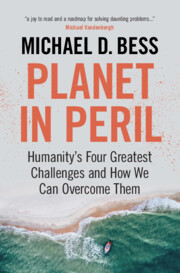Book contents
- Planet in Peril
- Reviews
- Planet in Peril
- Copyright page
- Dedication
- Epigraph
- Contents
- Fictional Vignettes
- Acknowledgements
- 1 Introduction
- Part I Existential Threats: The Four Most Pressing Dangers Facing Humankind
- Part II Strategies and Obstacles: The Solutions We Need, and What’s Preventing Them from Being Realized
- 6 How to Beat Climate Change
- 7 Wise Governance for Nukes and Pandemics: Where to Go Faster and Where to Slow Down
- 8 Controlling Things Versus Controlling Agents: The Challenge of High-Level AI
- 9 The International Dimension: Where Every Solution Stumbles
- Prologue to Parts III, IV, and V
- Part III Sensible Steps for Today’s World: Powerful Measures We Can Implement Right Away
- Part IV The Middle-Term Goal: New International Tools for the Late Twenty-First Century
- Part V The Long-Term Goal: Envisioning a Mature System of Global Governance for the Twenty-Second Century
- Endnotes
- Bibliography
- Index
Prologue to Parts III, IV, and V
Does History Have a Direction? Hegel, Smith, Darwin
from Part II - Strategies and Obstacles: The Solutions We Need, and What’s Preventing Them from Being Realized
Published online by Cambridge University Press: 13 October 2022
- Planet in Peril
- Reviews
- Planet in Peril
- Copyright page
- Dedication
- Epigraph
- Contents
- Fictional Vignettes
- Acknowledgements
- 1 Introduction
- Part I Existential Threats: The Four Most Pressing Dangers Facing Humankind
- Part II Strategies and Obstacles: The Solutions We Need, and What’s Preventing Them from Being Realized
- 6 How to Beat Climate Change
- 7 Wise Governance for Nukes and Pandemics: Where to Go Faster and Where to Slow Down
- 8 Controlling Things Versus Controlling Agents: The Challenge of High-Level AI
- 9 The International Dimension: Where Every Solution Stumbles
- Prologue to Parts III, IV, and V
- Part III Sensible Steps for Today’s World: Powerful Measures We Can Implement Right Away
- Part IV The Middle-Term Goal: New International Tools for the Late Twenty-First Century
- Part V The Long-Term Goal: Envisioning a Mature System of Global Governance for the Twenty-Second Century
- Endnotes
- Bibliography
- Index
Summary
The argument presented in the coming chapters rests on one basic premise: the cumulative power of small, incremental changes over time. I maintain that a much better system of global governance can gradually emerge over the coming century and a half, allowing humankind to successfully manage the dangers that threaten our survival. Part III describes what might be accomplished in the next 10 to 20 years; Part IV is tuned to the last decades of this century, around the year 2100; and Part V sketches a full-fledged global framework that might perhaps emerge by the mid-twenty-second century.
Who will supply the “purpose” in this process? Who will steer the boat? No one in particular – or, more accurately, all of us at once. Here I need to make a brief digression on the question of whether history has a deeper goal or directionality.
- Type
- Chapter
- Information
- Planet in PerilHumanity's Four Greatest Challenges and How We Can Overcome Them, pp. 126 - 130Publisher: Cambridge University PressPrint publication year: 2022

